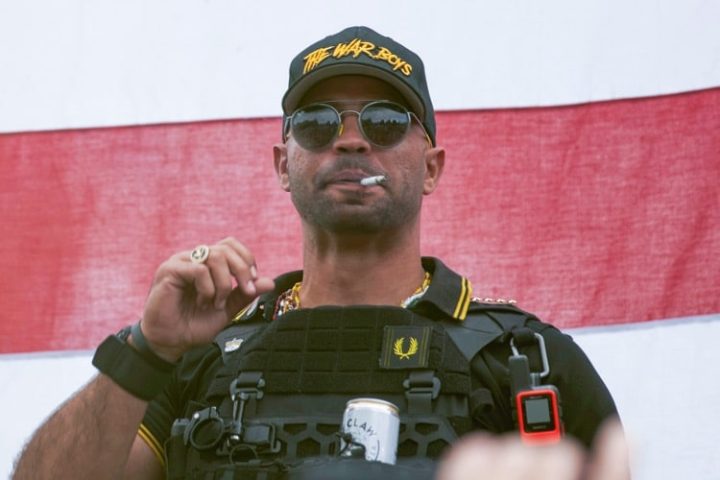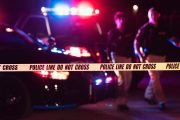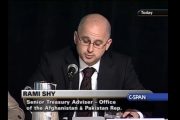
On May 4, a federal jury convicted Proud Boy members Enrique Tarrio, Ethan Nordean, Joseph Biggs, and Zachary Rehl of seditious conspiracy and conspiracy to obstruct an official proceeding over their alleged behavior during the January 6 protest at the U.S. Capitol. The 12 jurors who deliberated over the four-month-long trial, which began on April 26, also convicted Dominic Pezzola on numerous felony charges, excluding the crime of seditious conspiracy, though he was convicted of assaulting or impeding law enforcement and robbery.
The historic proceedings ended with all five defendants found guilty of the charges of obstruction of an official proceeding, conspiracy to prevent an officer from discharging any duties, obstruction of law enforcement during a civil disorder, and one count of destruction of government property. The verdict is still out on multiple counts of destruction of property and assaulting law enforcement.
Pezzola, who testified on his own behalf during the trial, allegedly stole a police riot shield during the clash between protestors and Capitol Police to protect himself from “sting balls” of chemicals being thrown into the crowd. Yet as American Greatness journalist Julie Kelly has reported, “It’s unclear how Trump-appointed Judge Tim Kelly will instruct the jury to proceed on unresolved charges.”
Until the Oath Keepers’ trial and conviction and subsequently the Proud Boys’ conviction, the January 6 “insurrection” narrative was all but fizzling. Prior to 2022, the statute for sedition, since it was instituted after the Civil War, has seen just a dozen Americans charged and even fewer tried for its crime, but none convicted.
The show trial January 6 Committee hearings aired nightly on cable news channels failed to prove that a coup d’état was planned and executed at the behest of former president Donald Trump, despite high-profile Washington actors testifying to the sinister nature of his presumed involvement. Even the “aha” moments — the “bombshell” testimony by former Trump aide Cassidy Hutchinson, for one — were like flares shot off to drive prime-time viewership but ultimately were panned as duds used for fueling rampant anti-Trump rhetoric.
Yet the 2022 convictions for the crime of seditious conspiracy, which carry up to 20 years in prison, have scripted a new chapter in the plot to pursue Trump as the criminal mastermind conjuring the events of that fateful day.
A newly released Politico report highlighting jury deliberations through the experience of one juror, Andre Mundell, makes clear that “Trump was a persistent undercurrent in the case.”
The report described how “prosecutors noted that his [Trump’s] invocation of the Proud Boys during a September 2020 debate turbocharged the group’s recruitment efforts. And his December 19, 2020 tweet urging supporters to descend on Washington to protest the election results on Jan. 6, 2021, was the moment that jumpstarted the Proud Boys’ seditious conspiracy.”
Noteworthy is that of the thousands of text messages exchanged within the group, the juror stated that it was the absence of evidence, the supposed deleted texts not submitted to the court, that clinched the guilty verdict for the group.
In convicting Tarrio, Nordean, Biggs, and Rehl, the juror claimed the “absence of key text messages” allegedly proved the defendants were concealing their activities and obfuscating critical evidence.
“The Proud Boys didn’t want everybody to know the plan, because then I guess it would have gotten out. And they didn’t want it to get out,” said Mundell in an interview with Vice News. Mundell told the outlet that “the thousands of messages they reviewed — extracted from the phones of Tarrio and his co-defendants — were peppered with blank slots where exchanges had been deleted.”
In the United States of America, how does a conviction for a crime as serious as sedition stand on the basis of the “absence of evidence?”
A Trial Marred in Controversy
Covering the events of January 6 more keenly than any other journalist, Kelly’s reporting offers a stellar summation of the inherent problems of the trial:
The nearly four-month trial was marred by controversy, including last-minute disclosures of numerous FBI informants; open hostility between the judge and defense attorneys; the accidental discovery of explosive messages between FBI agents discussing deleted evidence, a doctored report, and the surveillance of attorney-client jailhouse communications; multiple sightings in evidence of the still-uncharged Ray Epps; a convoluted appellate ruling on the legitimacy of a key charge in the case; and suspicions of a jury stalker.
The 12-panel jury, as Kelly notes, citing Lawfare writer Roger Parloff, consisted of “six jurors [who] had participated in liberal-leaning protests or marches, while none mentioned conservative-leaning demonstrations…. The protests included, in two cases, ‘women’s marches’; in two cases, ‘anti-gun’ marches; and, in four cases, protests related to Black Lives Matter or George Floyd’s murder, which, as we’ll see, are of particular concern in this case. One sitting juror had a Black Lives Matter sign in her yard.”
Crucially, the juror interviewed by Vice argued that the government could not present the evidence because it was “unrecoverable,” illustrating the Proud Boys “definitely didn’t want people to know.”
In contrast, Proud Boys defense attorneys argued that “all text and online communications exchanged amongst the defendants on January 6, which were exhibited during discovery, confirm they primarily conspired to return to their hotel rooms, attend a concert and safely return home to their young children following the protest.”
The emphatic juror noted that there was no evidence of the Proud Boys “standing down” or wishing to put a stop to the violence, that “they just kind of let it happen.” Mundell further suggested that it was his duty to the nation not to let this kind of thing happen again or to have it to be seen as okay.
He admitted that the jury wasted no time deciding the charge of sedition for the group, excluding Pezzola, who, according to Mundell, was not “closely tied enough to Tarrio or the group’s leaders — Pezzola took the stand and emphasized that he had only been in the Proud Boys for a month before Jan. 6 and barely knew his co-defendants.”
“Fedsurrection”
Pezzola’s attorney, Roger Roots, reacted to the verdict in an interview with the Gateway Pundit calling January 6 a “fedsurrection,” with the Proud Boys “doomed from the start” not only by the far-leftist jurors but also by a judge who “modified the definition of ‘seditious conspiracy’ from how the crime was previously used in the Oath Keepers [trial], lowering the standard as to what misconduct qualifies as sedition.”
“My understanding is that what now amounts to seditious conspiracy is so relaxed. They are charged with three conspiracies,” Roots said. “Count one is a seditious conspiracy; count two is a seditious conspiracy to obstruct an official proceeding; count three is obstructing an official proceeding without a conspiracy. Count four is conspiracy to commit civil disorder.”
“So, there are three separate conspiracies and the judge is basically instructing the jury that the same evidence could apply to all three — they could use the same exact evidence and convict on all three [counts].”
Roots vehemently argued that the “evidence that the government put on is a bunch of Tweets and Telegram chats about things leading up to J6 that were completely taken out of context. The vast majority of Telegram chats that are violent talk were about preparing for Antifa on the street. Half of it is just joking around and it’s all about Antifa and street fighting and things that have nothing to do with the US Capitol.”
Get Trump
While Mundell said the two events noted above were the extent of Trump’s relationship to the case, the proceedings mark a turning point in the war waged against the former president once again to keep him out of the office of the presidency at all costs.
“The evidence doesn’t show anything that Trump did other than ‘be there, will be wild’ and ‘stand back and stand by,’” he said. “That was his contribution to this case. Other than that, everyone was focused. I think they got a fair trial.”
But will the Department of Justice’s efforts be able to stop Trump’s presidential campaign? They certainly are coming after him. In an interview on Steve Bannon’s War Room, journalist Kelly remarked that sentencing in the trial was happening in September and that it was “going to be a source of continual headlines for the Left and for Democrats against Donald Trump and exposing his legal jeopardy until they finally do indict him.”
“He [Trump] will be indicted, it’s a matter on what,” continued Kelly. “I never thought for a while that they would bring seditious conspiracy charges against him, but now with this, and then the two Oath Keepers’ trials, where six Oath Keepers were found guilty on those same charges, affecting all of that on Donald Trump, I think certainly escalates that risk for him.”




